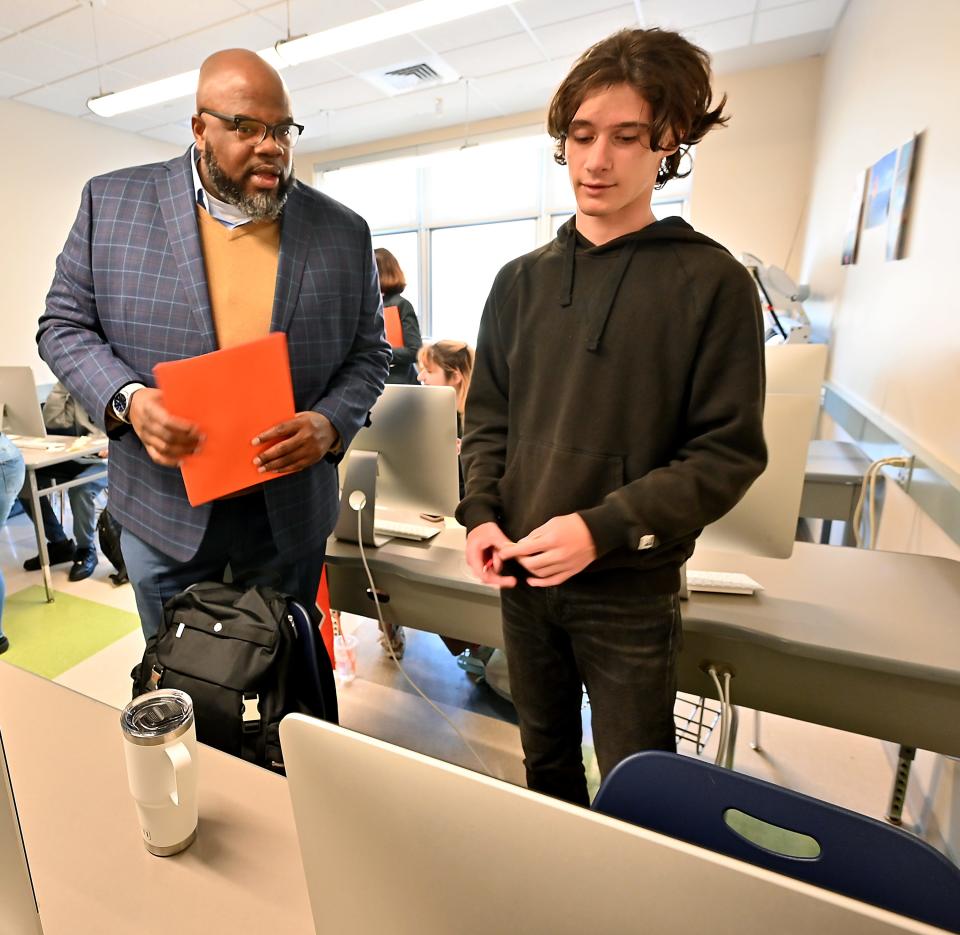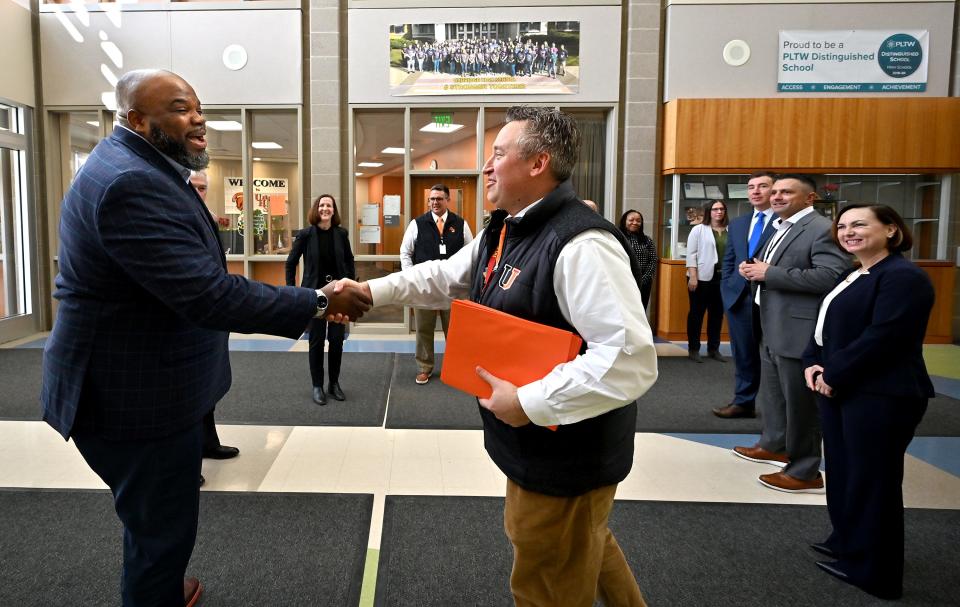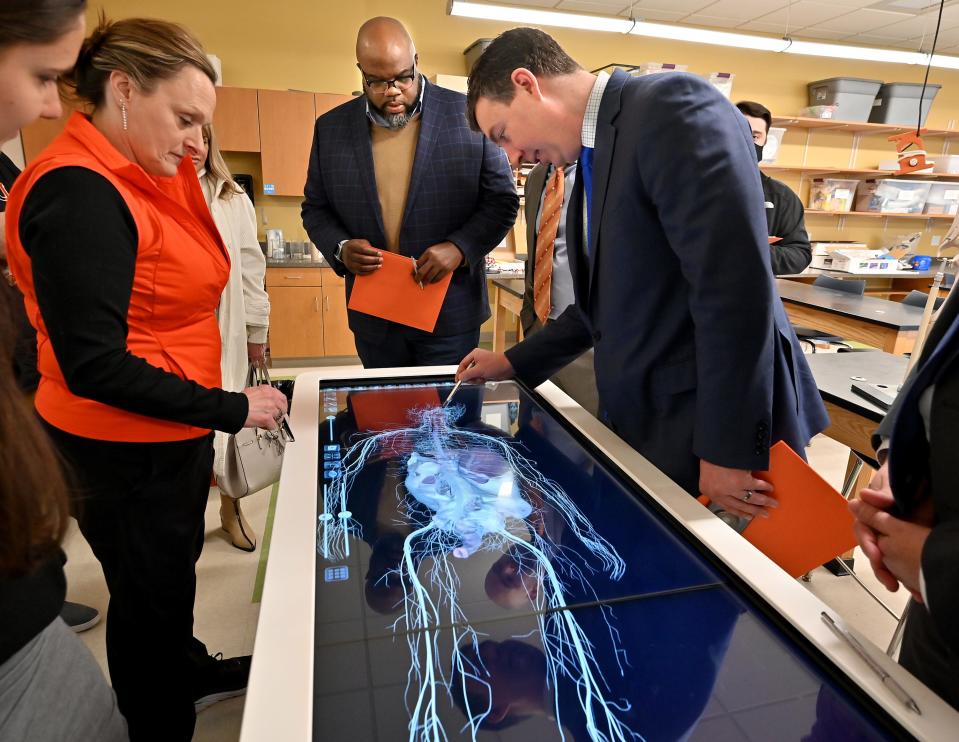New Mass. school chief Tutwiler follows career paths at Uxbridge High

UXBRIDGE — Lex Lovell and Julia Philbrook said they hope that by the time they are graduating from Uxbridge High School this spring, they’ll have found a solution to eliminating shoe odors.
The seniors, engineering students enrolled in the Innovation Pathways program at the school, were part of a student panel speaking to Patrick Tutwiler, the new state secretary of education, about their experiences during his tour of the program and its facilities Friday.
“I definitely feel like a lot of the seniors at other schools feel like they're just jumping off a cliff when they graduate. Like they don't know what they're going to do,” Philbrook said. “But I feel like we know exactly what we're gonna do, because we took the classes that we're interested in.”
The duo began the endeavor with months of research, before moving onto the prototype design and patenting.

Currently, their prototype has multiple attachments, including a sponge for applying the odor-eliminating solution, and a sponge for drying off the shoes.
While they haven’t cracked the secret to eliminating shoe odor yet, Lovell said being given the space to work in a lab and working with teachers who care about their success has helped push them to keep searching.
Philbrook said the program has helped prepare them for college and the workforce by giving them real-world experiences.
The Innovations Pathways program, which launched at Uxbridge and Worcester in 2018, enables students to integrate professional development and workforce experience into their regular core curriculum.
Four branches of pathways
At Uxbridge, the 205 students in grades nine through 12 enrolled in the program can choose from manufacturing, biomedical, media and information science, and business and finance.
The school has labs for each of the students, where they can gain experience analyzing cadavers on a virtual table, or laser-cutting materials to create things like personalized phone stands, including one for Tutweiler that he was gifted during his visit.

Students also have opportunities to gain internship experience during their program, having dedicated time to those professional experiences, including Edson Mendes, a senior in the business and digital media pathways, who has multiple blocks of his schedule reserved for an internship.
For Mark Iacovelli-Schweibish, another senior in the program, whose specialization is information technology, his internship at the school turned into a full-time job.
After the full-time faculty member who held the information technology technician position left for another school, Iacovelli-Schweibish and members of the school staff interviewed several other candidates. But Iacovelli-Schweibish said he quickly realized the perfect candidate was close by — himself.
The staff agreed and now he works for the district in that role, helping the elementary school and early education center with tech issues.
“I'm here during school, and then I also have my internship, so I'm working somewhere around 20 hours a week in the school,” said Iacovelli-Schweibish. “Then I'm actually putting in just around 10 hours a week of learning during school, so I'm doing more working than I am learning during my senior year.”
Seniors Trevor Masnyk and Tyler Erickson, both in the manufacturing pathway, have said the reason these programs work is because of the classroom environment and the teachers who guide them throughout the program.
“We've built special connections with them. They're the ones who wrote my letters of recommendation,” said Masnyk.
Erickson said that many of his teachers, whom the students have been working with since eighth grade, treat the students like adults rather than kids, and that it creates the feeling that they have real jobs.
When students succeed, teachers succeed
Daniel Sabourin, the tech engineering teacher who has been at the school for eight years, said one of the most valuable parts of teaching in the program is teaching students practical, real-life skills.
“My philosophy is, I’m a success as a teacher when the students are successful in living their dream,” he said.

Students not only learn how to use tools and woodworking in his classroom — which looks more like a Home Depot — but also spend time building materials for the classroom, from the stools they sit on to the storage areas where they keep their belongings.
There are 590 eighth- through 12th-grade students enrolled in Uxbridge High School. While eighth graders spend their year in an exploratory course, 47.5% of the rest of the grades are part of the Innovation Pathways program.
Tutwiler said he chose to visit Uxbridge’s program specifically because it was first, and it has “perfected” many aspects that he hopes to bring to schools throughout the rest of the state.
Gov. Maura Healey increased the budget for early college and Innovation Pathways programs by $14 million, bringing the total to nearly $47 million.
“We talk about the idea of reimagining high school…the kinds of things that we're seeing here around engagement, personalization, clear tracks and connection between what's learned in the classroom, and the work world are exactly the kinds of shifts that we want to see happen in high schools across the state,” Tutwiler said.
He said the other reason for investment and expansion of these programs is because of workforce shortages in different sectors, and providing students these spaces could potentially help fill those gaps.
Tutwiler wasn’t alone in exploring the different classrooms and pathways Friday as state Reps. Michael J. Soter, R-Bellingham and Joseph D. McKenna, R-Webster, and state Sen. Ryan Fattman, R-Sutton, were also in attendance.
“Uxbridge is the example of what we should be emulating for, not just my district, but for the state,” Soter said. “I represent Blackstone, Millville and Bellingham…this is what we desperately need.”
While Soter's districts have begun looking into giving students these opportunities, he said he wants to expand vocational education and programs like Innovation Pathways to help keep students engaged and make sure that kids stay in the district.
Soter said he was happy with Healey’s decision to choose Tutwiler as secretary of education and is excited about what he will bring to schools throughout the state in the future.
Uxbridge Public Schools Superintendent Michael Baldassarre said he was “thrilled” about having Tutwiler visit, as they are former colleagues, and his presence is validating for both students and teachers.
“It’s a big deal…We’re honored,” Baldassarre said.
Uxbridge High Principal Michael Rubin also found the visit validating, he said, and that having the state visit is valuable as they get to see up close how state funding and grants are being used in real time.
“There is a real clear connection between engagement and student outcomes,” he said. “We need people at the Statehouse level to continue to support and recognize that…To see that coming from a new administration is really heartwarming.”
This article originally appeared on Telegram & Gazette: New Mass. Secretary of Education Patrick Tutwiler visits Uxbridge High Innovation Pathways program

 money
money 